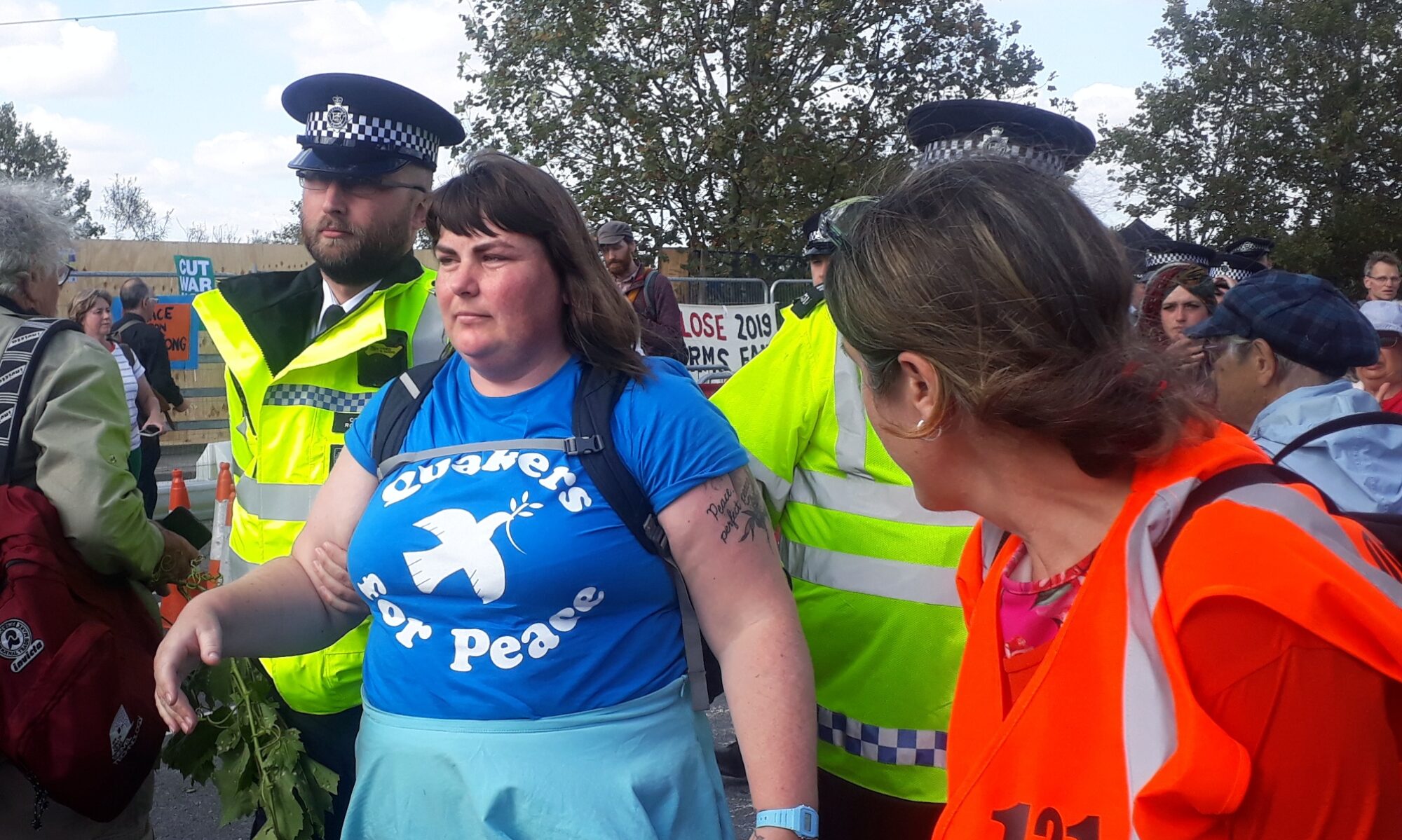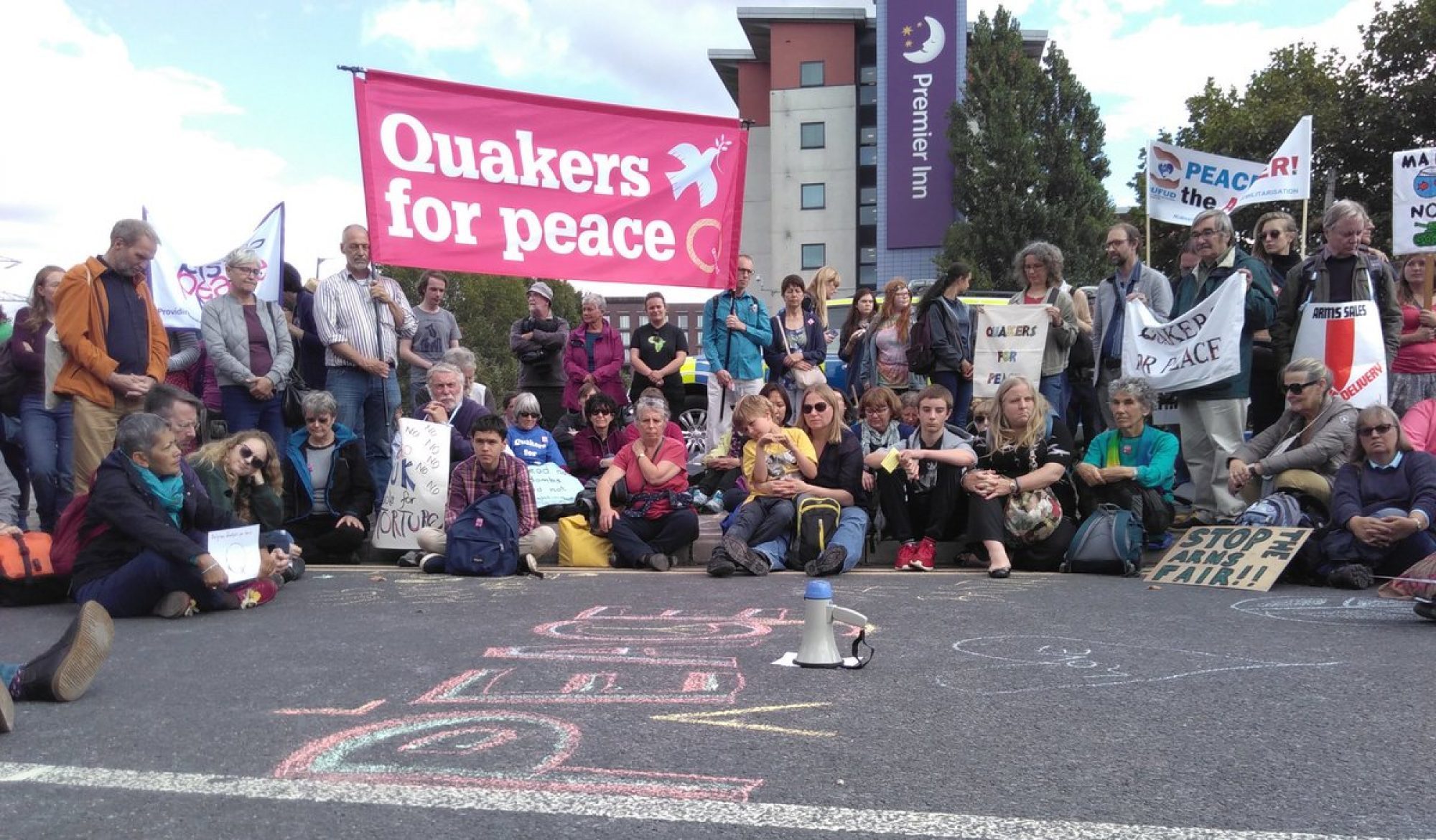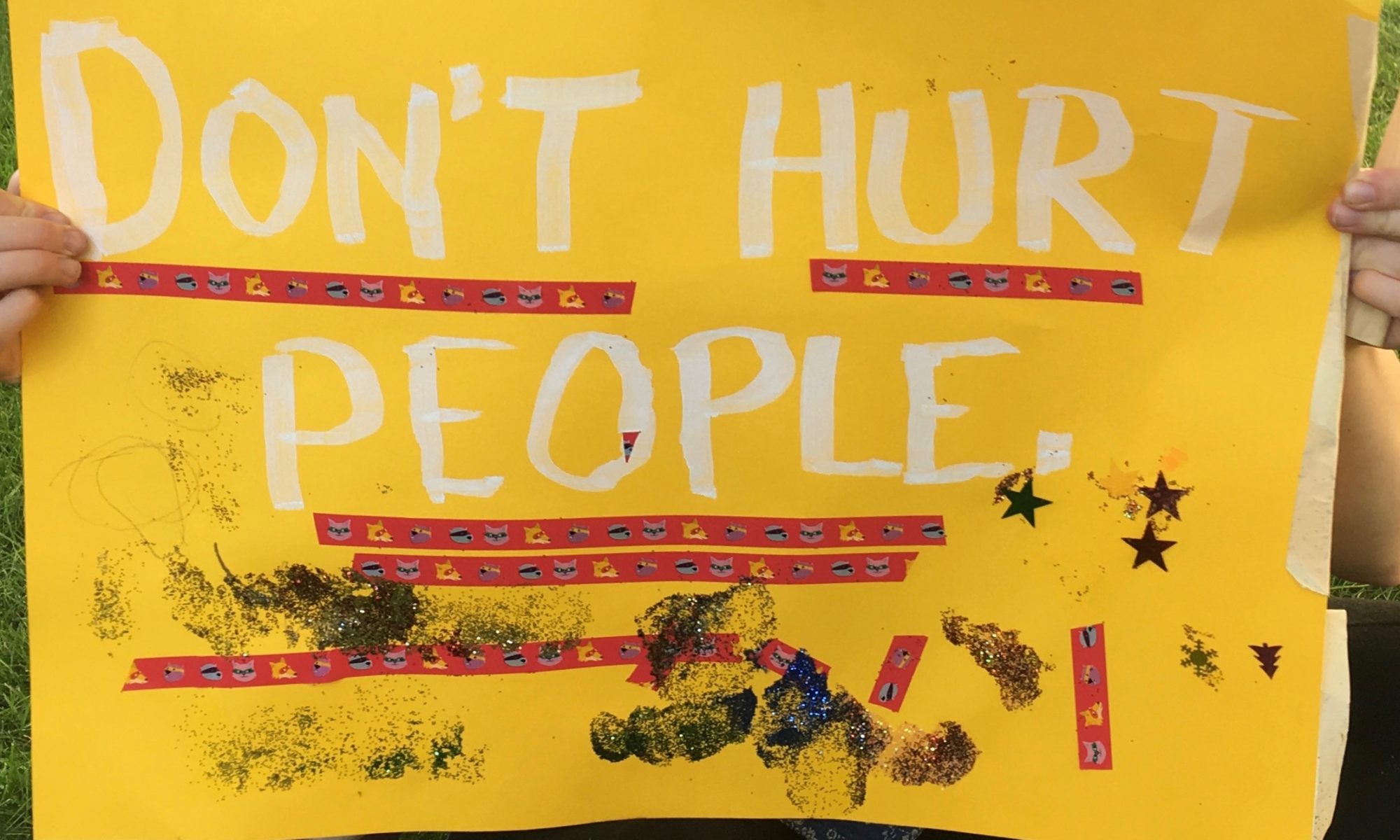Please note, this article was written before the murder of George Floyd at the hands of police officers in the USA, and the necessary conversations and protests about police brutality and structural racism both in that country and elsewhere that have followed. As the Quaker Roots core group we recognise that we have more to learn about these issues, our own complicity and ignorance, and that we need to reflect on our own structures and behaviours. We hope that you will engage with this process too, and have added some related links in the ‘Further reading’ section.
Before and after the Roots action last September we had questions from a number of Quakers about what our action consensus says about police engagement (the action consensus was a set of guidelines on how to approach our actions as part of the No Faith in War day, and can be found here). The part that seemed to give rise to the most questions was why we asked those engaged in the action not to hold ‘extended conversations with police officers’.
There are lots of different reasons why this was our approach, and we thought it would be helpful to explain them. We want to be transparent, and also to move forward conversations at a local level about this issue. We hope this is an opportunity for education and development for Quakers as activists.
The reasons for our approach include: taking the same approach as other groups across the whole week of action, making sure the protest space we create is open to all who want to participate, avoiding being party to information-gathering and inadvertently assisting in surveillance, and recognising the bigger picture within which all interactions with the police take place. Finally, we say something of what we think a ‘Quaker’ response to the police could be.
This article was written by Hannah, a Roots activist, with input from the Quaker Roots core group. This is quite a lengthy document, because it is an exploration of lots of issues, rather than a statement.
Being consistent with groups we’re taking action with
Firstly, we took the approach we did partly to be in line with other groups taking action as part of the Stop the Arms Fair week of action. This was in part a matter of consistency, so that people attending actions over the week were asked to uphold a similar approach to protest e.g. acting nonviolently, over the whole week of action. Importantly, it is also an acknowledgement that we were not ‘going it alone’. Roots working alone in this context would be almost impossible to imagine: we set the network up in order to take action initially against the Defence and Security Equipment International (DSEI) arms fair, as part of the long-established and experienced Stop the Arms Fair coalition. We were acting to support them, not be independent of them.
Furthermore, part of recognising that we are taking action within a network of groups is recognising who those groups are, and what we can learn from them and – maybe someday – teach. Across the whole week of action, groups taking part come from a wide range of communities and issue-campaigns, so they are much more diverse than Quaker communities in this country tend to be. This means we have things to learn from them.

Keeping the space safe for all, including those who fear the police
Next, we want and need the movements that we are part of (whether that be the peace movement, the climate justice movement, or economic and social justice struggles) to be diverse and to especially give space to and empower leadership from those who are ‘at the sharp end’ of these injustices. If they do not, these movements will be counterproductive. In order to do this we need to prioritise the relationships of people in the movement. We want to live out allyship by using protest spaces to speak and make connections with those who are part of the movement, rather than with the police. That’s our priority.
Everyone should remember that your own view of the police as an institution and as individual officers is shaped by your own personal privilege and status (a topic very live within Britain Yearly Meeting at the moment). This topic has a number of different facets. For example, whilst middle class, white people might feel fine having a friendly conversation with a police officer, people of colour, people with insecure immigration statuses, trans people and others, have sometimes had very negative experiences of the police, or may be more anxious since they know that they are more likely to suffer police brutality, or are disproportionately targeted e.g. by stop and searches. When those who feel comfortable engaging with police (because of their privilege) do so, it can make members of marginalised groups feel less safe and less welcome in those spaces. This is particularly ironic, given that black and brown people are more likely to face the violent consequences of weapons sales, both in the UK and worldwide. If we act in ways that deter people who are more likely to be affected by the very thing we’re protesting against from joining resistance struggles, this should give us pause and make us question and reassess our behaviour. Take the experience of the Wretched of the Earth in the 2015 March for Climate, Justice and Jobs as a sobering example: as they put it, the way they were treated on the day of the demonstration indicated a ‘colonial mentality’ which echoed the ‘history of conquest, genocide, and slavery’ at the ‘foundation of our modern economic system – the very system responsible for the global disaster that is climate change’. We do not want to recreate the militarist, racist mentalities that we protest against.
As a white, middle-class, cisgendered person I know instinctively that I still often see individual police officers as people who might help me in difficult situations. This is despite having witnessed huge numbers of negative experiences that people have had with police officers (and having had them myself), especially on protests, and despite hearing about decades of historic abuses against the LGBTQ* community of which I am part. This trust is very deeply ingrained in many people of my status and background. And it is not the same for everyone: quite the reverse.
‘Racist policing happened at last year’s DSEI as it happened at previous ones. If you can ignore this and expect to be treated well, that’s a luxury.’
There are real and recent experiences of different groups being differently policed at DSEI, and we do not believe this is coincidental. Repeatedly, we have observed and heard of smaller groups, or groups with more black and brown activists, being policed more heavily than the larger, older and whiter groups – which are also those that usually attend faith actions, including Quaker ones (I am by no means saying the No Faith in War day does not have people of colour participating – it did and has done at every one I’ve attended). Racist policing happened at last year’s DSEI as it happened at previous ones. If you can ignore this and expect to be treated well, that’s a luxury. I heard numerous accounts from Quakers saying that they felt the police treated them well (either at the day of action or during arrest later). That’s fine, but please do not extrapolate this experience out to everyone who was at the DSEI protests over the week, because it was not a universal experience.
Choices of protest tactics can also make some groups feel more excluded. Extinction Rebellion groups have been criticised, for example, for the emphasis on arrest as an aim. As Athian Akec, UK Youth Parliament member for Camden put it in his article When I look at Extinction Rebellion, all I see is white faces. That has to change ‘One friend of mine was stop-and-searched by the police 12 times last year. When I told him that the Extinction Rebellion protesters were purposefully getting themselves arrested, he rolled his eyes in sheer irritation. “That’s not an option for black people,” he said, adding that if he was arrested, the police would undoubtedly treat him differently, and his future career prospects might also be destroyed. The tactic of deliberately seeking arrest has further alienated disenfranchised communities like mine who, across generations, have had bad experiences with the police.”’ This fact informs Roots actions now and will in the future.
Affecting the police’s view of other groups, by comparison
Moreover, it’s inevitable that groups of activists will be compared to each other and that that comparison – be it conscious or unconscious – may be used to impose different kinds of police response. This is especially true when, as in the Stop the Arms Fair week of action, consecutive action days are being led by different struggles/campaigns e.g. stop arming Israel, no border, climate emergency, no faith in war, etc., and when other distinct groups, e.g. Kurdish community groups, also attend together. When a large group of predominantly (though not exclusively) white, older, middle-class-looking people – like Quakers – (who might generally expect to have neutral or positive encounters with the police) have ‘friendly’ conversations with police officers, it makes those who may want a more distant relationship (because they have had generally worse experiences of policing in their communities) look actively uncooperative by comparison. These differences can also serve to reinforce police biases. Both of these factors can result in groups that are less cooperative being confronted by a more defensive/aggressive style of policing.
I have noticed this in other contexts, where Quakers come to look like the ‘acceptable’ face of protesting, and others by comparison look threatening, merely for doing something other than what looks to outsiders like a load of people being quiet i.e. a meeting for worship. When a group of us were regularly protesting a fossil fuel company’s sponsorship of the British Museum by holding meetings for worship in the atrium a few years back, a manager once said “We like it when the Quakers come, you’re very easy to manage”. Maybe that’s OK in some ways, but it’s not very fair when other groups who try to be even slightly more interventionist end up looking confrontational by comparison, and are treated worse as a result – as if protesters should be expected to be completely docile, and Quakers are model examples of this.
A diverse range of people usually take action as part of the DSEI week of action, much more so than other movements that some of us have been involved in. We’ve had the opportunity to hear feedback from previous occasions, which is important since a lot of those people’s life experiences are not well represented within Quaker activist circles, so we have a lot to learn, and we really want to listen and respond to what they tell us.
Avoiding facilitating information-gathering and surveillance
Furthermore, during interactions with the police at protests, many of us will have had bad experiences of surveillance and information-gathering. What might look like small talk can be used to gather information on yourself and your fellow protesters: information which might have very serious consequences, for example being used in evidence against someone in court, or to commence deportation proceedings if their immigration status is not secure (have a look at a video about the role of police liaison officers from NetPol). Such information can also be used to prevent planned actions from taking place, because of police interference.
Police liaison officers are specially trained to do this information-gathering work in a ‘friendly’ way, so it’s quite easy to let things slip once they have gained your confidence. And it’s a really horrible feeling when you realise you’ve inadvertently shared something you do not have permission to share, or something which might incriminate someone else or put them at risk, or mean an action has less chance of success. Sometimes better (as a Roots activist from Scotland put it) to “keep schtum”?
The bigger picture
Finally, I am always aware when I am speaking to someone in a police uniform that this is never just an interaction between two people. It may be that as well, but ultimately police personnel are part of a system of security and control; a system that is willing to brutalise people in order to defend existing power structures. At protests, they are present to report on and gather intelligence from every interaction. They very rarely share their personal beliefs, but are performing a task that they have been given, and one that if they refuse to do, they will face reprimand, and perhaps even lose their job. They are also, at DSEI, not who we are at a demonstration to engage with and primarily to challenge – that is in this case the arms industry (companies, government involvement, etc). This of course involves the police (there are some great resources about police militarisation springing up), but we are there to stop DSEI, not focus on the police.
A Quakerly approach to police officers?
We understand that this approach to the police may differ from the approach some Quakers have taken in the past in other actions, and might feel strange and new. This has been the case for some in the Roots core group, too.
As Quakers, we acknowledge and are called to answer that of God in everyone (members of the police, arms dealers, protesters: everyone), and theologically and experientially, we recognise that anyone may be transformed by the Spirit at any time (I am cheekily reminded of the Seize the Day song P.C. 365, in which a constable who’d been policing the Faslane 365 protests changed ‘sides’ and decided to join the blockade right at the end…Sadly, though not surprisingly, this was a fictional account). However, this transformation does not necessarily happen only when we use words to persuade people i.e. don’t think that because you are not trying to talk a police officer round to what we’re doing, they’re not able to be affected by Quaker witness. I think that the Spirit can do things with and without us, through us and unbeknown to us. People can and do leave police forces because of what they see inside of the institution, and perhaps the treatment of social justice protesters contributes to this. We’ll still do what we do: singing songs, blocking roads, holding meetings for worship, standing our ground, trying to live the kingdom… and this can still have an impact on those witnessing it – police officers and others. I’ve never felt that in those moments, it was my powers of spoken persuasion that were going to be the most significant thing. Actions can speak louder than words.
‘….the Spirit can do things with and without us, through us and unbeknown to us.’
I know that many Quakers choose to respond individually to police officers specifically because they do not want to recognise or bow to the kind of dehumanising effect that uniforms can have. I’ve heard a lot of Quakers want to reject that, and go out of their way to see the unique individual ‘behind the uniform’. I want to acknowledge that impulse, but also to remind Friends that the ability to do that – to want to trust, take a risk, and respect and be courteous and warm to someone who has the ability to detain you which might mean your livelihood and long-term liberty is at risk, is a luxury which many do not have. I value the kind of ‘live as you want the world to be’ approach which in this circumstance would see everyone, whoever they are, as a human worthy of a conversation. Indeed, our action consensus opens: ‘We understand that throughout our action we will encounter many different people, including staff from the ExCeL centre, police officers, security guards, truck drivers, members of the public. We will recognise the humanity of all those we encounter, approaching them with dignity and respect.’ But I want that instinct to be understood in the context of power relations as they are in the world we live in. In this context, I believe that being called to be both salt and light (Matthew 5:13-16) means being allies to those protesting with us and those who suffer through the arms trade first and foremost, and being light to all present, but without endangering those who we work alongside, which friendly relations with police officers present can do.

These are some of the reasons our action consensus reads as it does, and we hope you can respect the approach, even if it differs from the approach you have taken in the past. All of this should be looked at in the context of a broader discussion around power and privilege, within Quakers and in our wider society. As a reminder, Roots are committed to nonviolence and do not advocate for violence towards police officers, or anyone else. What we were, and are, advocating, is for an understanding of how structural violence and inequality affects protests, and the people on them.
Hannah Brock Womack, on behalf of the Quaker Roots core group
Further reading
If you’re interested in finding out more about policing and/or protest (or in general), here are some places you could start:
- Leah Cowan, Are Extinction Rebellion whitewashing climate justice?, Gal Dem
- Open Letter from the Wretched of the Earth bloc to the organisers of the People’s Climate March of Justice and Jobs
- Kevin Maxwell, Sorry Cressida Dick, as a black former detective I know just how racist the Met still is, The Independent
- Mark Townsend, Black people ‘40 times more likely’ to be stopped and searched in UK, The Guardian
- Netpol, Talking to the Cops – A Guide for Protest Groups
- Northern Police Monitoring Project
- Athian Akec, When I look at Extinction Rebellion, all I see is white faces. That has to change, The Guardian
- Toolkit for action: Owning power and privilege, from Quakers in Britain
- Ru and Adam from London Campaign against Police and State Violence, From Minneapolis to London: who polices the police?, Freedom News
- Afua Hirsch, The racism that killed George Floyd was built in Britain, The Guardian



